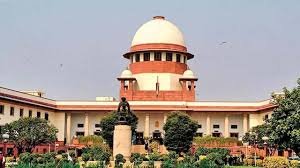By our legal Correspondent
New Delhi: A nine-judge Constitution Bench of the Supreme Court, in a majority judgment held on Nov 05 that not every resource owned by private players can be considered a “material resource of the community” to be used by the government to serve the “common good”.
The decision dismissed such a power of acquisition by the state while noting that it reminded of a particular “rigid economic dogma” of the past . The court noted that the Indian economy has already transitioned from dominance of public investment to co-existence of public and private investments.
The majority opinion authored by Chief Justice D Y Chandrachud said the interpretation that every private property could be used by the state as material resource to “subserve the common good” postulated a “rigid economic theory which advocates greater state control state control of private resources”.
The interpretation was introduced by late Justice V R Krishna Iyer in his dissenting opinion in Ranganath Reddy versus State of Karnataka in 1977. Justice Iyer’s opinion was relied on by subsequent Constitution Benches in Snjeev Coke Manufacturing and Mafatlal Industries judgments in 1982 an 1997pectively; hence, necessitating a reference to the nine-judge Bench.
Rejecting the view of Justice Iyer as one presenting a “particular ideology”, the majority opinion penned by Chief Justice Chandrachud said India has moved on from socialism to liberalization to market-based reforms.
India’s economic trajectory indicates that the Constitution, the custodians of the Constitution –the electorate have routinely rejected the idea of one economic dogma being the exclusive repository of truth. As participants of a vibrant multi-party democracy, the people have voted to power governments with various economic and social policies based on the country’s evolving developments, strategies and challenges,” Chief Justice Chandrachud observed.




